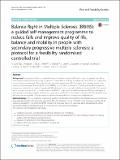Files in this item
Balance Right in Multiple Sclerosis (BRiMS): a guided self-management programme to reduce falls and improve quality of life, balance and mobility in people with secondary progressive multiple sclerosis : a protocol for a feasibility randomised controlled trial
Item metadata
| dc.contributor.author | Gunn, H. | |
| dc.contributor.author | Andrade, J. | |
| dc.contributor.author | Paul, L. | |
| dc.contributor.author | Miller, L. | |
| dc.contributor.author | Creanor, S. | |
| dc.contributor.author | Green, C. | |
| dc.contributor.author | Marsden, J. | |
| dc.contributor.author | Ewings, P. | |
| dc.contributor.author | Berrow, M. | |
| dc.contributor.author | Vickery, J. | |
| dc.contributor.author | Barton, A. | |
| dc.contributor.author | Marshall, B. | |
| dc.contributor.author | Zajicek, J. | |
| dc.contributor.author | Freeman, J. A. | |
| dc.date.accessioned | 2017-07-28T14:30:12Z | |
| dc.date.available | 2017-07-28T14:30:12Z | |
| dc.date.issued | 2017-07-27 | |
| dc.identifier | 250573102 | |
| dc.identifier | 03af9f2c-6f20-45b2-88df-886bb69f1a0b | |
| dc.identifier | 85046722242 | |
| dc.identifier | 000400254600021 | |
| dc.identifier.citation | Gunn , H , Andrade , J , Paul , L , Miller , L , Creanor , S , Green , C , Marsden , J , Ewings , P , Berrow , M , Vickery , J , Barton , A , Marshall , B , Zajicek , J & Freeman , J A 2017 , ' Balance Right in Multiple Sclerosis (BRiMS): a guided self-management programme to reduce falls and improve quality of life, balance and mobility in people with secondary progressive multiple sclerosis : a protocol for a feasibility randomised controlled trial ' , Pilot and Feasibility Studies , vol. 4 , 26 . https://doi.org/10.1186/s40814-017-0168-1 | en |
| dc.identifier.issn | 2055-5784 | |
| dc.identifier.other | RIS: Gunn2017 | |
| dc.identifier.other | ORCID: /0000-0003-3481-825X/work/64034684 | |
| dc.identifier.uri | https://hdl.handle.net/10023/11321 | |
| dc.description | This study is funded by the NIHR Health Technology Assessment Programme (14/176/12), United Kingdom. | en |
| dc.description.abstract | Background: Impaired mobility is a cardinal feature of multiple sclerosis (MS) and is rated by people with MS as their highest priority. By the secondary progressive phase, balance, mobility and physical activity levels are significantly compromised; an estimated 70% of people with secondary progressive MS fall regularly. Our ongoing research has systematically developed ‘Balance Right in MS’ (BRiMS), an innovative, manualised 13-week guided self-management programme tailored to the needs of people with MS, designed to improve safe mobility and minimise falls. Our eventual aim is to assess the clinical and cost effectiveness of BRiMS in people with secondary progressive MS by undertaking an appropriately statistically powered, multi-centre, assessor-blinded definitive, randomised controlled trial. This feasibility study will assess the acceptability of the intervention and test the achievability of running such a definitive trial. Methods/design: This is a pragmatic multi-centre feasibility randomised controlled trial with blinded outcome assessment. Sixty ambulant people with secondary progressive MS who self-report two or more falls in the previous 6 months will be randomly allocated (1:1) to either the BRiMS programme plus usual care or to usual care alone. All participants will be assessed at baseline and followed up at 15 weeks and 27 weeks post-randomisation. The outcomes of this feasibility trial include: • Feasibility outcomes, including trial recruitment, retention and completion • Assessment of the proposed outcome measures for the anticipated definitive trial (including measures of walking, quality of life, falls, balance and activity level) • Measures of adherence to the BRiMS programme • Data to inform the economic evaluation in a future trial • Process evaluation (assessment of treatment fidelity and qualitative evaluation of participant and treating therapist experience) Discussion: The BRiMS intervention aims to address a key concern for MS service users and providers. However, there are several uncertainties which need to be addressed prior to progressing to a full-scale trial, including acceptability of the BRiMS intervention and practicality of the trial procedures. This feasibility trial will provide important insights to resolve these uncertainties and will enable a protocol to be finalised for use in the definitive trial. | |
| dc.format.extent | 12 | |
| dc.format.extent | 722603 | |
| dc.language.iso | eng | |
| dc.relation.ispartof | Pilot and Feasibility Studies | en |
| dc.subject | Secondary progressive multiple sclerosis | en |
| dc.subject | Exercise | en |
| dc.subject | Self-management | en |
| dc.subject | Mobility | en |
| dc.subject | Accidental falls | en |
| dc.subject | Balance | en |
| dc.subject | Quality of life | en |
| dc.subject | Feasibility randomised controlled trial | en |
| dc.subject | RA0421 Public health. Hygiene. Preventive Medicine | en |
| dc.subject | T-DAS | en |
| dc.subject | SDG 3 - Good Health and Well-being | en |
| dc.subject.lcc | RA0421 | en |
| dc.title | Balance Right in Multiple Sclerosis (BRiMS): a guided self-management programme to reduce falls and improve quality of life, balance and mobility in people with secondary progressive multiple sclerosis : a protocol for a feasibility randomised controlled trial | en |
| dc.type | Journal article | en |
| dc.contributor.institution | University of St Andrews. School of Medicine | en |
| dc.contributor.institution | University of St Andrews. Cellular Medicine Division | en |
| dc.identifier.doi | https://doi.org/10.1186/s40814-017-0168-1 | |
| dc.description.status | Peer reviewed | en |
This item appears in the following Collection(s)
Items in the St Andrews Research Repository are protected by copyright, with all rights reserved, unless otherwise indicated.

